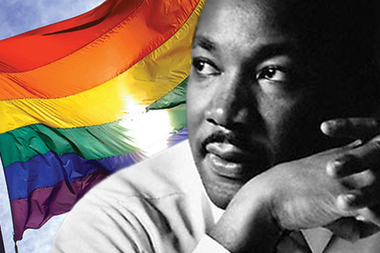Martin Luther King Jr.: A millennial perspective

by Michael Lane
Op-Ed
As a 20-year-old queer man living in America, I have endless gratitude toward Martin Luther King Jr. Some may ask why I feel so strongly about him and the movement he led.
While I cannot speak for the benefits I have received from Dr. King in correlation with the color of my skin, I can speak volumes on how he created an atmosphere for change when LGBT+ Americans needed it most.
In 1909, the NAACP was founded, which laid the foundation for our remembering 20th century America for social and political activism. 35 years later, the gay rights movement began. This action, while not perfect, was revolutionary: gay men together, attempting to correct everyday injustices that were brushed under America's living-room rug.
Related:
MLK statue "well worth the effort"
Trump, in flap with civil rights icon, meets with MLK's son
King Day highlights transition from Obama to Trump
People like Harry Hay, founder of the Mattachine Society, rode on the coat-tails of the civil rights movement to say, "Why not us too?" I doubt this groundbreaking part of our history would have taken place without the help of the civil rights movement.
An upward climb, dwarfed by the backbreaking work done by the civil rights leaders of the time. Dr. King realized it was impossible to undo the harm done by prejudice but spent his life being beaten and criminalized to make America more equal for minorities. He took oppression and transformed it into momentum.
The incredible work done by the black civil rights movement was monumental in how I am allowed to carry myself today. I can be a human being today just as hundreds of thousands of queer Americans can be humans, thanks to their work.
King's and black activists' demonstrations like the Montgomery bus boycott, the creation of sit-ins and the March on Washington revolutionized the meaning of ‘power to the people.' The protest had never been so powerful as theirs, which, I think, paved the way for the gay liberation movement.
I think this made the queer community realize they were done waiting for rights to fall in their lap. Police brutality and a climate for change sparked the Stonewall riots, led by Marsha P. Johnson, one of the first African American leaders of the gay liberation movement.
I take the position I'm in today for granted. Is there total justice? No. America is far from true equality between the majorities and minorities. But without the previous generations, I wouldn't be able to be who I am today.
Someday, I hope Dr. King and the other revolutionaries of protest can inspire us, as a community, to continue change. Our generation need never resist progress in the world and keep the momentum powered by the actions of the civil rights movement alive.
As a white 20-year-old queer man living in America, the openness I am allowed is due to Dr. King. He changed the way minorities hold themselves in society, no longer lesser but equal, just different and deserving the same life everyone else lives.
The Gayly 1/13/2018 @ 6:09 p.m. CST





